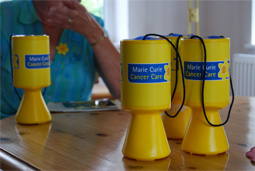Corporate social responsibility (CSR) is part of everything we do as a company and our CSR programme covers various aspects of our operations from working with communities and charities to recycling waste at our manufacturing facilities around the country.
In the community
Making a difference to the local communities we serve is at the heart of everything we do. Our employees are extremely committed to this ethos and support hundreds of local activities every year.
From organising fundraising events to helping out at village fetes, our staff donate a large amount of their time to helping good causes in their areas. By listening to and understanding the needs of local communities our employees are able to respond by providing help where it is really needed.
Charity of the Year 2012/13
Marie Curie Cancer Care
In 2012 Dignity raised £42,000 for Marie Curie Cancer Care and will continue to support this charity in 2013.
Marie Curie Cancer Care provides high-quality nursing, totally free, to give people with terminal cancer and other illnesses the choice of dying at home supported by their families.
In 2010, Marie Curie cared for over 30,000 patients, across the whole of the UK. It costs just £20 to provide one hour of nursing care so your help can make a big difference.
There are nine Marie Curie hospices across the UK, located in; Belfast, Bradford, Edinburgh, Glasgow, Hampstead London, Liverpool, Penarth and Solihull.
Each Dignity branch and crematoria has been linked with their local fund raising office so that the money you raise will help to care for cancer patients in their community.
"I am delighted that we are supporting Marie Curie Cancer Care as our new corporate charity," said Dignity Chief Executive, Mike McCollum. "This is a great opportunity for Dignity funeral homes and crematoria to help raise funds for a national charity that makes a real difference at a local level."
"We are overjoyed that Dignity has chosen Marie Curie Cancer Care as its official corporate charity for 2012," said Marie Curie fundraising director, Fabian French. "On behalf of everyone at Marie Curie Cancer Care, I would like to thank Dignity employees in advance for their support over the year. We are confident that this partnership will be a great success. Marie Curie Nurses have worked with Dignity employees across the country in the past, so we are excited to now be able to build on this to raise money for the charity. This partnership will help ensure that more people with a terminal illness receive the right care at the right time in the place of their choice and Dignity staff will play a huge role in this."
Environment
We recognise the impact of our operations on local surroundings and are committed to maintaining the quality of the environment in which we all live by operating in accordance with our environmental policy.
We undertake to act whenever necessary to meet or exceed the standards of current environmental legislation and continue to review our policies, systems and services to find way to limit our environmental impact.
Dignity’s coffin manufacturing facility in East Yorkshire, gained ISO14001 accreditation in 2011.
ISO14001 is an internationally accepted standard that sets out how you can go about putting in place an effective Environmental Management System. The standard is designed to address the delicate balance between maintaining profitability and reducing environmental impact.
Dignity’s voluntary application for ISO14001 began in June 2010 with an assessment of the environmental impact of the business from the sourcing of raw materials to emissions to land, air and water during manufacture to energy sources and transportation. From this the management set targets for reducing the environmental impact of their business and developed a programme for implementing them. The review and improvements were independently approved and regularly audited by a third-party specialist with goals set for continual improvement.
Dignity is investing £7m in its crematoria to conform to the government directive to reduce mercury emissions from crematoria by 50% before the end of 2012.
Dignity has already installed this specialist technology at nine of its crematoria and during 2011 began the necessary construction work and installation at Oxford, Chichester, Loughborough, Nuneaton and Weston Super Mare Crematoria. The installation of this new equipment will be completed in 2012 and has been managed so as to ensure there is no disruption to our usual services at the crematoria.
Due to this investment 15,479 cremations at Dignity crematoria were mercury abated during 2011.
Health and safety
Our aim
Effective heath and safety management continues to be vital to Dignity and a key priority of the directors. Our operations are conducted at all times in such a way as to ensure, as far as is reasonably practical, the health, safety and welfare of all our employees and all persons who may be attending our premises.
Dignity has a full-time Health and Safety Manager who is dedicated to these issues and is supported by a Health & Safety Officer.
Regional Health & Safety Officers operate in each of the geographical funeral trading areas. Dignity’s head office, crematoria and manufacturing facility also have their own manager with responsibility for Health and Safety. The majority of these managers and officers have qualifications from the National Examination Board in Occupational Safety and Health (NEBOSH) qualified or are scheduled to take these examinations.
Dignity has 15 managers with qualifications from the National Examination Board in Occupational Safety and Health (NEBOSH). Within this group there are also 10 that possess the NEBOSH Fire Certificate.
Dignity also has 102 managers or officers that have successfully completed the Institution of Occupational Safety and Health (IOSH) course.
There are also 143 employees that have completed the Chartered Institute of Environmental Health (CIEH) Working Safely one-day course.
Effective health and safety management
Health and safety performance is measured in two ways.
- Proactive monitoring
Health and safety is proactively monitored via quarterly return analysis, premises inspections, health surveillance, line manager observations of how tasks are performed and regular reports to the Board of Directors - Reactive monitoring
Investigating accidents, collation and analysis of statistics and ill-health investigation reactively monitors health and safety.
Training programmes and initiatives
To achieve the NEBOSH qualifications employees had to study current legislation and best practice over a year-long course and successfully complete a written two-hour examination plus a two hour practical assessment.
There are 36 employees that have received Fire Marshall training.
Over 700 Dignity employees attended the Manual Handling training course during 2011. By attending this course it is intended that our employees will have a greater appreciation of the risks of any manual handling required by their role with the objective of reducing the number of injuries incurred by our Funeral Service Operatives.
Supporting our staff
Our employees are critical to our continued success. We are committed to high standards of employment practice and aim to encourage and develop successful employees through training and communication.
We provide direct support to employees through both in-house training and external training courses. External training includes both relevant job training and tutoring for professional qualifications. We provide additional support to staff development through our Welfare Trust, which provides funds for professional training and hardship grants.
We keep all employees informed of what is happening within Dignity through our quarterly in-house magazine, Dignity Express, which is supplemented by monthly news bulletins. News, useful information and background on Dignity are also available to staff via a dedicated employee website, which was re-launched in 2008.

